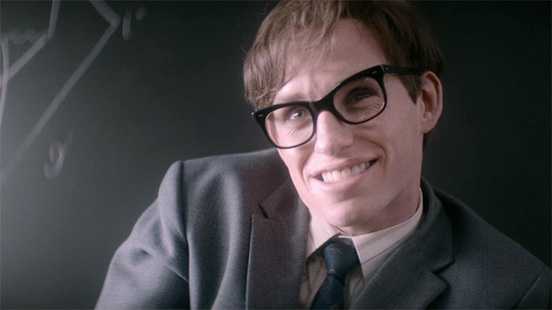The year is 1963, and Stephen Hawking (Eddie Redmayne) is a brilliant but quite awkward cosmology student at the University of Cambridge. Determined to find a “simple, eloquent explanation” for the universe, he charms and becomes enamored with an arts major and fellow Cambridge student named Jane Wilde (Felicity Jones). The 21-year-old’s always-present clumsiness worsens over a few months until it finally leads to a fall in the middle of his university quad; he is hospitalized and soon diagnosed with motor neuron disease. He is told the disease will not deteriorate his brain, but will leave him with limited speech and movement before taking his life within two years. Undaunted, Jane insists that they can fight the disease together. The couple soon weds and begins a family, despite Stephen’s continued physical decline. Stephen goes on to finish his doctorate, detailing his initial theory on the creation of the universe and continuing on to study the concept of time.
I cannot understate the magnificence of Eddie Redmayne’s performance as Stephen; while his face looks somewhat like Stephen Hawking in a jarring way, that isn’t nearly his most impressive feat. The deterioration of his physical movements is astounding to watch, as he seems to lean ever so slightly more into the awkward movements in a precise and nuanced manner that is easy to perceive yet feels carefully enhanced with each scene. Not only is Eddie able to walk, sit, and move in gradually more awkward manners towards the beginning of the film, but he also talks and reacts with an increasingly jutting chin and slumped stature. The spiral of losing control is palpable, yet Eddie clearly conveys both the exasperation of living and the excitement Stephen finds in his work. I hate to call a performance Oscar-worthy, but I'm willing to overcome that discomfort to properly convey Eddie's amazing feat.
Given such a dazzling performance by Eddie Redmayne, it might be easy to overlook the rest of the film’s characters; however, this would be a serious disservice to the fantastic Felicity Jones as Jane. She made the decision to marry Stephen believing her time with him would be short; as his health deteriorates and two years stretch to ten, she must care for both him and their children while attempting some intellectual fulfillment. Again and again, she realizes the magnitude and thankless exhaustion accompanying her decision. Strong and unyielding in her care for Stephen—even as she develops feelings for a family friend—she suffers largely in silence, though Felicity’s portrayal allows that silence to be incredibly dynamic.
Despite stellar performances by Redmayne and Jones, several directorial choices took me out of the story. When Stephen learns of his motor neuron disease, the doctor appears to sit at an awkward angle that attempts to convey Stephen’s inability to process the magnitude of the information; however, the entire exchange feels too prepared and try-hard. It fails to create the real sensory and palpable experience it could have. I was left with a similar craving but disappointed feeling at several other points in the film.
Still, the film manages to be incredibly inspiring. While it doesn’t delve into Stephen’s theories as much as I expected, it still takes the time to convey a few of his points without feeling at all like it relied on the “complicated math on a chalkboard means this guy is brilliant right?” archetype. As a non-science major, I appreciated the simple explanation of his ideas but I wasn’t impacted as much as the chemical engineering student I attended the screening with. She had goose bumps at several particularly significant science-related moments.
I love movies based on real stories, and I believe it’s important to stay true to the subjects and storyline. Stephen Hawking lent his distinct, computerized voice to the production for Eddie to use in the film’s later scenes, and that lent a level of realism to the film I particularly enjoyed. However, Stephen Hawking’s endorsement in a much more explicit manner excites me about the film’s realistic portrayal of his story: “I thought Eddie Redmayne portrayed me very well” and “at times, I thought he was me.”
Grade: B+

 RSS Feed
RSS Feed
